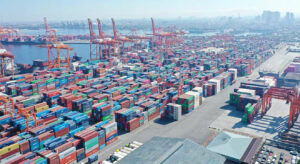THE Philippine Ports Authority (PPA) said late Monday that port fees remain a minor component of logistics expenses, and an increase in the charges cannot be blamed for any “blow up” in logistics costs.
“Storage fees at ports remain low… with taxes and shipping costs getting most of the share for every container on the move,” the PPA told BusinessWorld via Viber.
Citing a $7,600 container shipped from China to Manila as an example, the PPA said that the total logistics cost of the container may blow up to $50,000 because of customs charges (40%), shipping costs (36%), trucking costs (16%), and terminal operator and port authority costs (8%).
“That is almost 50% of the additional charges from the small container. Maritime transportation, customs clearance, inland logistics, and port charges are among the burdens for consumers,” the PPA said.
Transportation and logistics costs are the key expenses between production and sale, the PPA said.
The PPA said that a top concern for businesses, more than the storage fees, are container deposits, which are charged by shipping lines against truckers, customs brokers, and forwarders.
“(These) have been the decade-old problems for every cargo shipment, which usually costs P10,000 up to P30,000 for dry containers and up to P180,000 for refrigerated containers,” it said.
“Port fees remain the lowest of the charges; there are many hidden logistics costs added, mostly from all of the expenses incurred by moving the product and mostly the unregulated charges by the shipping lines,” it added.
PPA was responding to the Philippine Exporters Confederation, Inc. (Philexport) call to exporters to brace for a 16% increase in cargo handling fees at Manila ports.
According to Philexport, the increase at the Manila South Harbor and the Manila International Container Terminal was confirmed through a letter sent by PPA Manager for Commercial Services Mark Jon S. Palomar in response to a petition to defer tariff hikes until the industry has recovered.
The increase, which is said to be based on the consumer price index adjustment factor from 2020 to 2023, will be executed in two tranches no earlier than Aug. 5.
The first tranche will involve a 10% increase in cargo handling fees, while the second tranche will involve a 6% increase that will be implemented six months after the initial increase takes effect.
The export group has been opposing any cargo handling rate increases at Philippine ports, including the 32% increase in storage charges for foreign containers that was implemented in January.
The proposed increase due in August was also opposed by Philippine Chamber of Commerce and Industry Chairman George T. Barcelon, as importers and exporters are already being challenged by the increase in shipping costs caused by geopolitical uncertainty in the Middle East.
“I don’t think it would be prudent for them to increase… Maybe this is not the right time because businessmen are already having challenges,” Mr. Barcelon said. — Justine Irish D. Tabile
